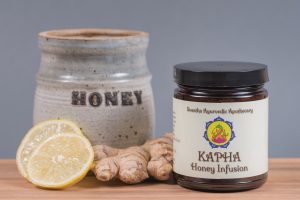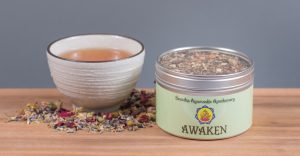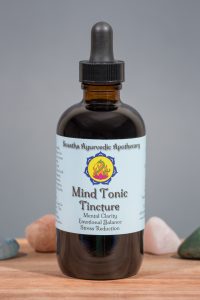 In the science of Ayurveda, the wintertime is known as the season of Kapha dosha, and for good reason. This season generally brings about a feeling of heaviness, sleepiness, increased hunger (which often means increased weight gain), decreased movement, and a general state of sluggishness. All of these factors plus the extreme dark and cold conditions that winter brings can easily shift one’s mental state to match the heavy, dark, cold qualities of this season.
In the science of Ayurveda, the wintertime is known as the season of Kapha dosha, and for good reason. This season generally brings about a feeling of heaviness, sleepiness, increased hunger (which often means increased weight gain), decreased movement, and a general state of sluggishness. All of these factors plus the extreme dark and cold conditions that winter brings can easily shift one’s mental state to match the heavy, dark, cold qualities of this season.
Although Kapha types will be most affected by the increased Kapha in our environment during the wintertime, all body types can just as easily become prey to these not-so-desired qualities that winter often bestows upon us. Even areas such as my hometown in Colorado can induce a state of Seasonal Affective Disorder (SAD), despite our fairly mild and extremely sunny winters. Of course, if you live in an area that is mostly grey, damp, cold, and dreary throughout the winter months, it will be even more essential to take the proper steps to counterbalance the heaviness before it manifests. Here are some symptoms to look out for.
Common Symptoms of the Winter Blues (Seasonal Affective Disorder)
- Chronic low energy
- Exhaustion that does not go away with sleep
- Dull, foggy mind; poor concentration
- General feelings of heaviness (both physically and mentally)
- Low motivation for activities
- Sedentary lifestyle
- Difficulty falling asleep at night
- Excessive sleep (9+ hours nightly)
- Daytime sleeping
- Excessive appetite
- Increased craving for heavy foods such as sweets and refined carbs
- Weight gain
- Low confidence, poor self-worth
If you are prone to or currently experiencing multiple symptoms listed above, it is time to create some lightness and balance in your life. It is never too late to make the proper changes you need to find a healthy state of mind and body. Here are some highly recommended and effective ways to balance the heaviness this winter season (or anytime it is needed!).
Uplift Wintertime Depression with Ayurveda
1. Lighten up your diet.
When too much heaviness is occurring in your body or mind, it is essential to balance this out by increasing the light quality in your life. One very effective way to promote lightness (termed laghu in Ayurveda) is to increase the intake of lighter foods while avoiding heavy ones. Since winter is the season of Kapha and depression is a Kapha predominant emotion, following a Kapha-reducing diet may be helpful. Some simple ways to implement this are:
- Keep dinner light in quality, small in quantity, and easy to digest.
- Avoid all food after 6 pm.
- Reduce or eliminate heavy foods such as dairy, meat (especially red meat and pork), wheat, gluten, refined grains, refined sugars, and processed foods.
- Take in more light foods such as broth-based soups, kitchari, dals, steamed veggies, quinoa, buckwheat, and millet.
- Sip on a spicy tea blend between meals such as Tulsi Synergy Spice, AWAKEN Tea, or Detox Tea.
- Use stimulating spices such as Kapha Churna, ginger, turmeric, black pepper, cinnamon, and Trikatu.
- Take a digestive appetizer before meals such as our Kapha Honey Infusion or Agni Elixir.
Read our Eat For The Winter Season Guide here!
2. Keep a healthy sleep schedule.
Kapha types and individuals with a Kapha disorder (such as depression) tend to crave sleep when out of balance. This can lead to sleeping 10+ hours each night or staying up late and sleeping late into the morning—neither of which is recommended when trying to treat depression.
Instead, create a healthy sleep schedule by going to bed at an ideal time, awakening early, and sleeping between 6-8 hours each night. Here is an optimal sleep routine to follow when treating depression or any other Kapha imbalance.
- Bedtime: Asleep by 10-11 pm
- Awake time: Awake and out of bed by 5-6 am
- Total sleep: 6-8 hours
This may take some training if your sleep schedule is extremely different, however, this will be a crucial part of the treatment and should be administered, even if you simply shift the hours and amount of sleep by 30-60 minutes each week. Please remember it is not only how long you are sleeping but when you are sleeping that will help you regain balance and lift depression.
3. Avoid daytime sleeping.
With the cold, dark, and dull days that are prevalent during the winter season, it is very common to feel the need to nap throughout the day. Unfortunately, daytime napping is extremely Kapha-provoking and will only promote more heaviness, dullness, and sluggishness in the body and mind, causing the depression to increase further.
If you are accustomed to taking a daytime nap, try to replace this unwanted habit with a stimulating activity. Here are some examples to try.
- Get outside and take in 10 deep, belly breaths in the fresh air.
- Splash cold water on your face with your eyes open.
- Take a brisk walk.
- Sip on a stimulating (but herbal) tea blend.
- Stay hydrated by sipping on warm-hot water between meals.
- Perform 5 sun salutations.
- Perform legs up the wall for 3 minutes.
- Perform Kapalabhati Pranayama.
These activities involve increasing the blood flow in the body and oxygen to the brain and will be much more beneficial for treating depression rather than increasing it further.
4. Begin each morning with 10 sun salutations.
With a new wake-up time of 5-6 am, you are likely to feel a bit sluggish upon awakening until this new schedule becomes a bit more natural. By performing 10 sun salutations each morning you will get your blood pumping and energy flowing! The sun salutation is a great full-body movement activity for Kapha dosha and promotes a sense of lightness, warmth, and motion. It will help remove dullness in the mind and remove stagnation that has accumulated throughout the night. All of these factors will help you begin your day with a solid foundation and counterbalance the heavy, dull, and sedentary nature that depression brings.
5. Perform Nasya (nasal oil) each morning.
Nasya is the application of nasal oil and is a very effective way to treat mental and emotional imbalances. When treating depression or any other Kapha imbalance in the mind, you should use a more stimulating nasal oil that contains the herbs Vacha and Brahmi such as our Prana Nasya. These herbs are specific for treating mental imbalances and are beneficial for removing the heavy, dull qualities that penetrate the mind when dealing with depression.
Directions: Each morning at least 30 minutes before food intake, apply 3-5 drops of the recommended nasal oil in each nostril while the head is comfortably tilted back. Take a deep inhale in through each nostril after the application and lay back with the head tilted for at least one minute to allow the oil to absorb throughout the sinus cavity. For the best results be consistent!
6. Keep a positive attitude—positive energy attracts positive energy!
This may be easier said than done, but it is extremely important to keep a positive outlook despite the contradicting feelings of depression. Negative energy breeds negative energy and will only take you deeper into a depressed state. Instead, use awareness to really take a look at your thoughts and become more conscious of these negative patterns you are creating. Once you become aware of these patterns you can begin to break free of these habits. It may be contrived at first, but just as with any new activity, it will become easier and more natural with consistent practice.
For example, if you find yourself dwelling on the notion that you are not good enough and do not deserve to be happy, switch this thought process around and tell yourself that you are amazing and deserve the best in life. With total awareness of your mind, you will begin to see and recognize these negative thought patterns as they are and this is the first step to creating real change!
7. Get 30 minutes of intentional movement (aka exercise) each day.
The grey, cold days of the winter season and the depression that comes with it often lead to a sedentary lifestyle. Lack of movement will inevitably lead to increased Kapha, weight gain, fatigue, stagnation, dullness, sluggishness, low self-esteem, and a deeper state of depression. Alternatively, getting at least 30 minutes of intentional movement each day (this does not include walking around at work, sorry!) will counterbalance these Kapha predominant qualities, giving you a new sense of physical and mental lightness.
This can be performed in one go or in several rounds if needed. For example, some days you may do 10 minutes of sun salutations each morning, take a 10-minute brisk walk on your lunch break, and another 10-minute walk after dinner. Some days it may be more appropriate to go to the gym and perform a 30-minute session on the elliptical. No matter what you choose on any given day, the most important factor will be consistency. Of course, if you find yourself falling off the wagon for several days, it is not too late to jump back on! Here are some exercise options that will be more geared for Kapha and the depression that it brings.
- Brisk walking (ideally in fresh air)
- Swimming
- Biking
- Elliptical
- Stair machine
- Lightweights done with quick repetitions
- HIIT workouts
- Hiking
- Mild to more intense Yoga
- Zumba or a fast-paced dance class
- Aerobic classes
- Home exercises using quick repetitions (if you need inspiration, check out YouTube for lots of fun options!)
8. Get some fresh air every day.
It is easy to become habituated to staying inside and hibernating throughout the winter. Unfortunately, this will only provoke your depression further as the winter months go by. The cold weather is not going anywhere, so suck it up, bundle up, and get some crisp, cool fresh air each day. Some days may be warm enough for you to take a walk, especially if you make time mid-day when it tends to be at its warmest point. Other days might be a bit too cold for a real walk which means you will have to simply bundle up and step outside for a few deep breaths in the fresh air.
This simple practice will increase oxygen throughout your body, boost your vital Prana (lifeforce), and allow you to soak in some sunlight—all of which are extremely beneficial for your psyche. You have already committed to 30 minutes of movement each day, so you might as well do it outdoors when possible!
9. Welcome Self-care into your daily routine.
Self-care is an essential factor in any healthy daily routine. Since the state of depression is often plagued with feelings of low self-worth, these nourishing tools will be a powerful way to show yourself the love and care you deserve. Here are some of my favorite self-care techniques that are more specific for the winter season and the depression that it brings.
- Ginger Baking Soda Bath
- Self-oil massage (abhyanga) using a warming, stimulating oil such as Kapha Massage Oil
- Sauna
- Exercise
- Yoga
- Meditation
- Journal
- Spend some time in nature
No matter what you choose, it will be essential to perform at least 3-7 self-care practices each week throughout the winter season to prevent or treat or prevent seasonal depression.
10. Perform Kapalabhati, three times daily.
Kapalabhati is a well-known breathing technique used in Yoga therapy. It is a stimulating and heating breath and a powerful way to combat Kapha imbalances in the body and mind. Whether you are looking to prevent seasonal depression or treat the depression that has already manifested, performing this breathing technique throughout the day will help remove stagnation, dullness, and heaviness while stimulating circulation, digestion, and metabolism.
Directions: Perform 4 rounds of 27 breaths three times daily; once in the morning (after the sun salutations), once before lunch to rev up your digestion, and again before dinner.
Click here for detailed instructions on how to perform Kapalabhati pranayama.
11. Herbal support.
When dealing with an imbalance of any kind you must first and foremost apply the proper diet and lifestyle changes needed to create balance. However, an appropriate herbal regimen will undoubtedly help to expedite your healing process while you slowly make the other necessary changes (yes, they take time!).
When dealing with seasonal depression, it is often useful to take stimulating herbal remedies that reduce heaviness, increase blood flow, remove stagnation, stimulate the mind, boost the mood, and treat the overall Kapha. Some of the top Ayurvedic herbs and herbal formulations that fall into this category are:
- Trikatu
- Mind Tonic Tincture
- Super Greens Energy Fusion
- Saraswati Churna
- Prana Nasya
- Punarnava
- Ginger
- Chitrak
- Brahmi (avoid if bi-polar disorder is present)
- Vacha
No matter the herbs you choose, be consistent with them by taking them at similar times daily. If you are dealing with a severe case of depression, it may be best to seek guidance from a knowledgeable Ayurvedic practitioner to get personalized treatment and individualized formulations.
Conclusion
Seasonal Affective Disorder is often caused by the increased Kapha that is predominant throughout the winter season and is related to the cold, heavy, dark, damp, dull qualities this time of year brings. Whether you are looking to prevent or treat seasonal depression, create balance in your life by focusing on a lightening, stimulating diet, lifestyle, and herbal regimen. By making these beneficial changes slowly but steadily, you will begin to feel a greater sense of lightness, energy, and positivity throughout your being. By using Awareness and taking control of your thought patterns, you can begin to create long-term emotional balance and well-being throughout the winter season and beyond!





